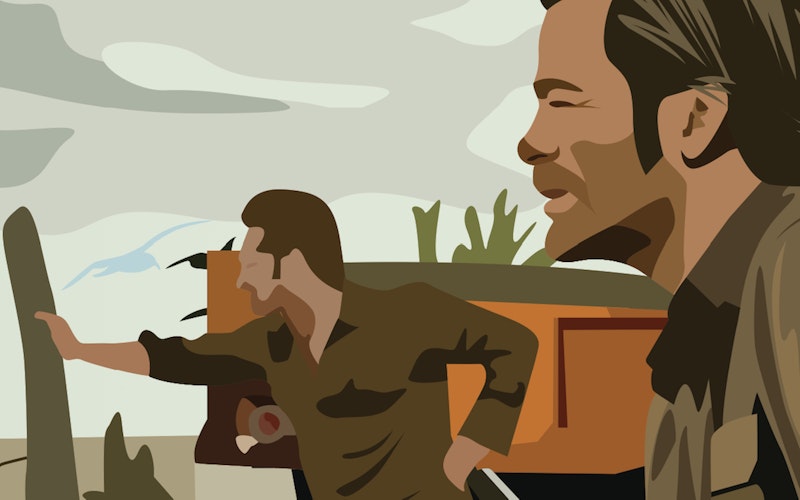
Movies
Hell or High Water’s Sweltering Critique of the Prosperity Gospel
Editor’s note: This is part of a series on the 2017 Best Picture nominees. All of the articles are available as a pdf package here.
About halfway through David Mackenzie’s Best Picture nominee, Hell or High Water, two Texas Rangers watch as a televangelist roars at them through a small hotel television screen. Reminiscent of a real-life Texas pastor, the preacher’s sermon reflects what’s known as the “prosperity gospel”—the belief that if one sows faith and obedience to God, they will reap or be rewarded with personal benefits.
“God doesn’t say, ‘No,’” the minister punctuates in a southern drawl. “Whatever you believe becomes the truth.”
Growing agitated, Ranger Marcus Hamilton (played by the amusingly grizzly Jeff Bridges) growls to his colleague, “God doesn’t talk to this man any more than he talks to my dog.”
Hell or High Water may have all the fixins of a classic, if contemporary-set, western—thieves, oil, and greedy land grabs—but it can also be viewed as an indictment of the legalistic cues of the “health and wealth” gospel. In Mackenzie’s tough look at economic disparity in rural West Texas, the lines of punishment and reward curl together like the threads in its characters’ worn flannel shirts. Some individuals receive proper dues for their sowing; i.e. they get what they deserve. Then there are those, particularly the less influential, who plant and receive nothing, for others have stolen their harvest away.
This theme of personal entitlement is told through the lens of two siblings turned outlaws. Hitting up small banks for quick cash grabs, Toby Howard (Chris Pine) and his wild ex-con brother Tanner (Ben Foster) work to meet a strict deadline: they must accumulate $43,000 by the end of the week or their family land will become the property of Texas Midlands Bank. Before her death, the boys’ mother entered a reverse mortgage deal that offered just enough to cover her meager expenses. When she passed, ownership of the ranch was due to go with her.
The televangelist’s message just doesn’t play here.
Hell or High Water isn’t preachy, but more akin to the “straight-shooter,” or lone cowboy who “tells it like it is.” Whether it’s the image of a billboard with the words “Fast Cash” emblazoned on the front or graffiti that laments corporate bailouts at the expense of working people, the background details often reveal the movie’s hand. This is a fable chronicling the fall of the self-sufficient American cowboy under the power of faceless institutions. If the prosperity gospel is the freedom to create your own reality, Hell or High Water imagines that freedom being yanked away without recourse. This is a world where hard-working people are left out to wrinkle in the parched West Texas heat. Banks exploit the elderly for profit. Manifest Destiny decimates Native American culture—a reality referenced by Hamilton’s part-Comanche partner (Gil Birmingham). A soldier serves his country only to return to a foreclosed home. The televangelist’s message just doesn’t play here.
In her book, Blessed: A History of the American Prosperity Gospel, Kate Bowler cites a recent survey finding that 43 percent of Christians believe God grants the faithful health and wealth. A surprising two-thirds “agreed that God wants people to prosper.” Sure, we may scoff at Toby and Tanner’s decisions, or even the bank’s financial maneuvering, but Mackenzie’s tall tale pushes us to consider what our visions of the good life have in common with these brothers.
Whether tempted towards the prosperity gospel or just a corrupted version of the American dream, our decision to place trust in either of these philosophies can often lead to the path of Toby and Tanner (taking what we feel like we deserve) or Texas Midlands Bank (exploiting others to build our own fortunes). This likely won’t involve heists or predatory loan programs, but it often reveals itself in those daily decisions that force us to choose between ourselves and others.
Hell or High Water is a knotty tale, yet it’s not without a moral center. In one scene, Toby says to Tanner, “You talk like we ain’t gonna get away with this.” Tanner’s reply illustrates the film’s hesitancy to glorify what might have easily disintegrated into a Robin Hood-style cliché: “I never met nobody that got away with anything, ever.” There is Someone keeping score—even if fair hands aren’t dealt immediately.
In the film’s riveting conclusion, after the rangers and the robbers have finally come head to head, Hamilton and Toby speak of punishment and justice against a beautifully harsh landscape. Their western world is simultaneously inspiring and imposing. As to the fate of these characters, and what they deserve, the film doesn’t say. Rather, the narrative ambiguously ends as the camera settles into the middle of a shaggy field.
This final image, too, seems to defy the simplistic theology that typifies the prosperity gospel. What is wheat and what is the chaff? Will they eventually be separated? The answer to that question doesn’t follow the outline of homilies promising riches and physical strength. It’s far more mysterious than we often realize, even if eternity promises a great reckoning.
Topics: Movies, Culture At Large, Arts & Leisure